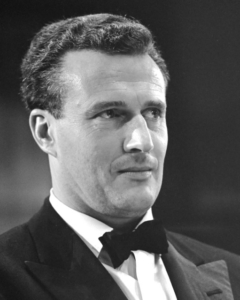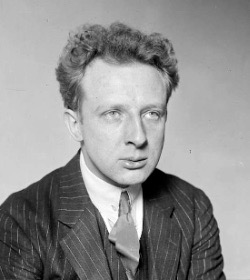REVIEW POTPOURRI — Conductors: Sir Colin Davis & Leopold Stokowski
 by Peter Cates
by Peter Cates
Sir Colin Davis
The first Boston Symphony concert I ever attended at its Symphony Hall, on Massachusetts Avenue, presented its then Principal Guest Conductor Sir Colin Davis (1927-2013), and no relation to last week’s Sir Andrew Davis, in a program consisting of Haydn’s 84th Symphony, Stravinsky’s Danses Concertante, for a much smaller group of musicians and the late 1930s 4th Symphony of Ralph Vaughan Williams (1872-1958).
My previous familiarity with Sir Colin lay in three splendid records on the now defunct Philips label – Mozart’s very sublime Sinfonie Concertante for Violin and Orchestra and the 2nd Violin Concerto with soloist Arthur Grumiaux, another Grumiaux record of the Brahms Violin Concerto and the Berlioz Te Deum for a massive orchestra, organ and choir consisting of over 900 voices.
Davis’s conducting had a most eloquent, gracious poetry uniquely his own in which dramatic intensity would be held back until it was called for in a piece of music. The records displayed it but I wasn’t prepared for the phenomenally graceful charismatic figure he displayed on stage and the rapport with the players who gave their all in the charming Haydn and the powerful Vaughan Williams 4th, itself with a volcanic fury foreshadowing the war clouds gathering in Europe when Hitler was re-building the German military machine. (The Stravinsky piece was one I just couldn’t get into.)
The Boston Symphony players included a few gentlemen who had connections to Maine – violinist Roland Tapley and trumpet player Jerry Goguen had summer cottages in the Pittsfield/Newport lakes region while tympanist Vic Firth, himself a charismatic figure in his music making on the kettle drums, had spent formative years in Sanford and established a still thriving drumstick manufacturing business, named simply Vic Firth, in Newport.
Violinist Roland Tapley joined the orchestra in 1921 at the age of 18 at the invitation of then Music Director Pierre Monteux (1875-1964) before Serge Koussevitzky (1874-1951) arrived in 1924 for his own legendary tenure of 25 years.
Leopold Stokowski
Mussorgsky Pictures at an Exhibition and Tchaikovsky 1812 Overture. Leopold Stokowski conducting the New Philharmonia Orchestra in Pictures and the Royal Philharmonic in the 1812. London Treasury cassette, reissue of 1960s recordings.
Leopold Stokowski continued to record highly personalized, very persuasive performances up to the year he died at the age of 95, in 1977. The Pictures was his own transcription of Mussorgsky’s original composition for solo piano instead of the more famous one that Maurice Ravel did in 1922 and Stoky threw in just about every possible instrument. The 1812 Overture had a chorus at its conclusion unlike most performances for orchestra alone but spared the actual cannon and other artillery, usually recorded separately for safety purposes.
* * * * * *
From Clarence Day’s 1935 memoir Life with Father:
Father declared he was going to buy a new plot in the cemetery, a plot all for himself. “And I’ll buy one on a corner,” he added triumphantly, “where I can get out!”
Mother looked at him, startled but admiring, and whispered to me, “I almost believe he could do it.”
* * * * * *
Mozart: Magic Flute – Otto Klemperer conducting a Budapest Opera cast on a March 30, 1949, broadcast. Urania URN 22.129, two CDs, 1999.
Otto Klemperer (1885-1973) had several productive years after World War II conducting the Budapest Symphony and Opera before the Stalinist government forced him out. The now forgotten singers in this cast- bass Mihaly Szekely, tenor Laszlo Nagypal, sopranos Julia Osvath and Maria Matyas etc., all did splendid work in this opera from Mozart’s last years and the composer’s tribute to Masonic rituals.
Swedish film director Ingmar Bergman released his own production of the opera in 1975 and I have viewed it several times in cinemas in New York City, Boston and at Waterville’s own Railroad Square.
A recommended experience for even those who might not otherwise like opera.
Responsible journalism is hard work!
It is also expensive!
If you enjoy reading The Town Line and the good news we bring you each week, would you consider a donation to help us continue the work we’re doing?
The Town Line is a 501(c)(3) nonprofit private foundation, and all donations are tax deductible under the Internal Revenue Service code.
To help, please visit our online donation page or mail a check payable to The Town Line, PO Box 89, South China, ME 04358. Your contribution is appreciated!




Leave a Reply
Want to join the discussion?Feel free to contribute!